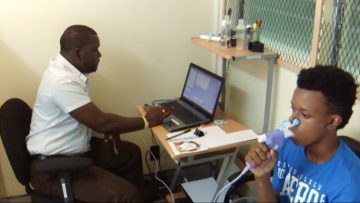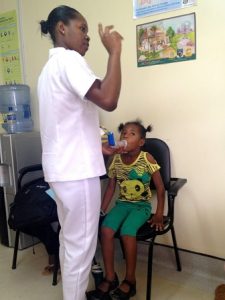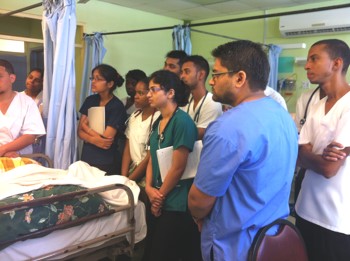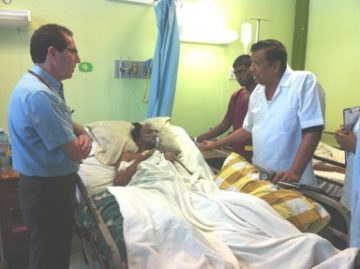Submitted by Dr. Robert Levy
Since 2013, a Vancouver-based respiratory team has been working to empower local nurses and doctors to perform diagnostic testing for asthma and COPD and to deliver education and self-management skills at Georgetown Public Hospital.
Getting Started
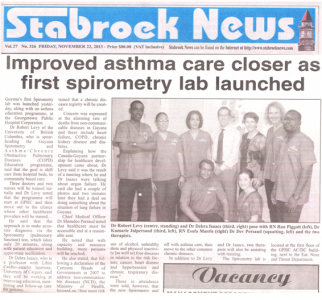 In the winter of 2013, Dr. Robert Levy, a lung specialist and Professor of Medicine from the University of British Columbia in Vancouver, Canada had the good fortune to meet with Dr. Deb Isaac, a cardiologist from the University of Calgary. Dr. Isaac had recently initiated a development project in the small South American nation of Guyana to provide echocardiography diagnostic capacity for children with congenital heart diseases so that appropriate treatment could be instituted. This was in conjunction with a training program for local health care professionals to develop skills in performing diagnostic echocardiography. Dr. Isaac had noted that there were major gaps in management of chronic respiratory diseases in Guyana, especially asthma and chronic obstructive lung disease (COPD), both of which are highly prevalent in the country.
In the winter of 2013, Dr. Robert Levy, a lung specialist and Professor of Medicine from the University of British Columbia in Vancouver, Canada had the good fortune to meet with Dr. Deb Isaac, a cardiologist from the University of Calgary. Dr. Isaac had recently initiated a development project in the small South American nation of Guyana to provide echocardiography diagnostic capacity for children with congenital heart diseases so that appropriate treatment could be instituted. This was in conjunction with a training program for local health care professionals to develop skills in performing diagnostic echocardiography. Dr. Isaac had noted that there were major gaps in management of chronic respiratory diseases in Guyana, especially asthma and chronic obstructive lung disease (COPD), both of which are highly prevalent in the country.
Dr. Levy accompanied Dr. Isaac on a site visit to the Georgetown Public Hospital in Guyana to perform a needs assessment, which confirmed that there were no pulmonary function facilities available in the country. Furthermore, there was little in the way of structured, chronic disease management for patients with asthma.
As elsewhere, asthma is very common In Guyana affecting more than one in ten people, ranging from infants to the elderly. Asthma results in frequent visits to emergency departments, hospitalizations and mortality. It has huge impacts on patients, their families and caregivers, cost to the health care system, as well as to society in terms of loss of productivity. The approach to asthma in Guyana was acute episodic management rather than a more comprehensive chronic disease management model despite the ready availability of international asthma guidelines directed at developing nations that are inexpensive and highly effective. Asthma being a highly prevalent chronic condition in which simple, inexpensive interventions can have a huge impact represented a huge opportunity for intervention.
The timing for initiating such a project was excellent, as the Guyanese Ministry of Health had recently developed a new strategic plan that focused on integrated prevention and control of non-communicable chronic diseases. A plan was developed in conjunction with the Georgetown Public Hospital and the Guyana Ministry of Health to initiate the Guyana Asthma Education and Spirometry Program (GASP) that would provide spirometry equipment and training for the purpose of accurately diagnosing asthma, as well as to improve capacity by teaching local healthcare professionals to deliver education and self-management skills to patients in order to reduce the huge impacts of asthma.
The aims of GASP were to:
1) Develop the first pulmonary function testing laboratory to perform spirometry (a simple, inexpensive test for accurately diagnosing respiratory conditions such as asthma and COPD)
2) Develop capacity and sustainability by training local health care providers to perform spirometry as well as to deliver education and self-management skills to patients with asthma
The Program Setting- Guyana
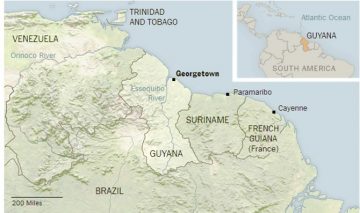 Guyana, with a population of approximately 800,000, is located in the northeastern region of South America and is the only English-speaking nation on the continent. With close physical proximity and a common language, Guyana has strong ties with the Caribbean Islands and is an active trade member in CARICOM. The ethnic roots include approximately 50% South Asian, 35% African American and 6% Amerindian origin. Guyana achieved independence from Britain in 1966 and is a republic with a parliamentary democracy. It is a low resource setting, the economy being largely based on natural resources, and there is limited tourism. The major (and only) sizable city in Guyana is Georgetown with a population of approximately 180,000.
Guyana, with a population of approximately 800,000, is located in the northeastern region of South America and is the only English-speaking nation on the continent. With close physical proximity and a common language, Guyana has strong ties with the Caribbean Islands and is an active trade member in CARICOM. The ethnic roots include approximately 50% South Asian, 35% African American and 6% Amerindian origin. Guyana achieved independence from Britain in 1966 and is a republic with a parliamentary democracy. It is a low resource setting, the economy being largely based on natural resources, and there is limited tourism. The major (and only) sizable city in Guyana is Georgetown with a population of approximately 180,000.
Guyana has a socialized public health system with significant financial and health delivery limitations. The Georgetown Public Hospital is the primary referral center with approximately 750 inpatient beds and extensive outpatient clinics. Most health care resources are directed towards acute care and diseases common to developing nations, especially infectious diseases and conditions associated with poverty and public health gaps (nutrition, hygiene, vaccination, etc.).
The GASP Program
Dr. Levy’s search for Vancouver team members to get the program off the ground was met enthusiastically by a number of highly motivated, skilled healthcare professionals. These included two highly experienced respiratory
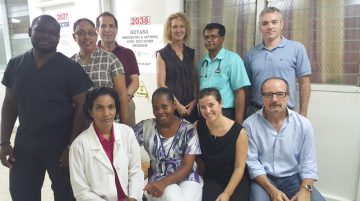
The GASP Team
Back (L to R): Esofa Piggott, RN; Dr. Radha Luknauth; Dr. Robert Levy; Carmen Rempel, RRT; Dr. Dev Persaud; Dr. Jay Johnston
Front: Dr. Kumarie Jaipersaud; Yusiny Maxwell, RN; Catherine Sanders, RRT; Dr. Mario Scuri (Chiesi)
Missing: Belanda McIntosh, RN
therapists, Carmen Rempel and Catherine Sanders. They both have extensive experience in diagnostic lung function testing, as well as advanced training and expertise as Certified Respiratory Educators and in chronic disease self-management. Dr. Jay Johnston, an accomplished respirologist with established interest in global health, also signed on with the GASP team.
The GASP program was formally initiated in the fall of 2013 and since then the team has had five further training and development visits. The initial team trips were conducted pro bono; it was highly fortunate that an application for financial support for the program was approved by Chiesi Foundation Onlus in late 2013 for a three year period commencing in the spring of 2014. GASP has also benefited from administrative support from the British Columbia Lung Association.
The local Georgetown-based GASP health care team is comprised of three registered nurses (RNs), one full-time physician as well as two physicians in training (one adult and one pediatric). All are employed by the Georgetown Public Hospital Corporation (GPHC).
GASP Activities
A) Pulmonary Function Testing (spirometry)
A number of laptop-based handheld spirometers were provided to GPHC by GASP. The local doctors and nurses received on-site training from the Vancouver team in order to develop special expertise in performing spirometry to accurately diagnose the presence and severity of asthma and other respiratory conditions. Careful attention has been paid to quality control. One Guyanese physician and one nurse have received further advanced education in an accredited RespTrec© training program in Canada, as well as having the opportunity to visit and learn at host teaching hospitals in Vancouver. In order to assure the quality of test performance and interpretation, all spirometry results are electronically reviewed remotely by members of the Vancouver team.
B) Asthma & COPD Education
All patients referred to the GASP program diagnosed with asthma or COPD undergo education focused on understanding the disease condition, medication utilization, trigger avoidance and lifestyle modification (eg. smoking cessation, diet, exercise). The objective is to provide patients and their families with the skills necessary to decrease the likelihood of disease exacerbations and to reduce emergency department visits, unscheduled physician visits and hospitalizations.
C) Health Professional Teaching
Although the major focus of GASP is service delivery, considerable effort has been directed at teaching local health professionals about lung disease and respiratory care. This teaching targets a wide variety of individuals including physicians, nurses medical students, residents and other local health care personnel. Numerous in-service education sessions have been provided to care providers in the GPHC Emergency Department, the Intensive Care Unit and medical wards. Continuing Health Education programs have also been delivered for community providers in Georgetown as well in other hospitals and health centers across Guyana.
D) Patient Care
The physicians from the GASP team are often called upon to provide consultations for patents with respiratory illnesses. In general, every attempt is made to provide patient assessment and care in a manner that optimizes teaching opportunities in order to enhance the capacity and knowledge of local health professionals.
E) Quality Control & Research
Much attention is paid to quality control, with extensive data collection utilized for this purpose. This data has been further utilized to generate research relating to the opportunities and challenges encountered in establishing a program such as GASP in a low resource setting. A number of research presentations have been delivered at the national Guyana Medical Science Research Conference, and a manuscript has now been submitted to an internationally recognized peer-reviewed journal for publication.
GASP Progress to Date
Over 700 patients ranging in age from four to eighty years have now participated in the GASP program. These patients have been referred from the GPHC Emergency Department, hospital wards and clinics, as well as from community health centres and from other towns in Guyana. GASP has resulted in reduced emergency department visits as well as increased patient referrals to community health centres for ongoing chronic disease management.
In order to capitalize on learnings from the establishment of GASP (what works and what doesn’t work) and promote spread, an outline of a prototype Global Asthma and Spirometry Program has been developed (“GASP in a Box”) for dissemination to interested parties.
In November 2015, Dr. Mario Scuri (Clinical Program Leader, Head Respiratory Unit, Chiesi Group) joined the GASP team on a training visit to Georgetown to evaluate progress to date. Dr. Scuri, a trained lung specialist, was in fact a welcome addition to the team and got directly involved in training local staff, teaching students and caring for patients!
Future Directions for GASP
Lots of work remains to be done! A number of evolving projects include:
- Increasing local health care provider capacity with development of a “train the trainer” program;
- Developing culturally appropriate teaching materials for patients and families;
- Identifying opportunities for a Guyanese physician to participate in further advanced training in lung disease at Canadian university health centre;
- Partnering with other developing chronic disease management projects (eg. heart failure, diabetes, chronic kidney disease) in Guyana;
- Training local GASP team staff to provide guideline-directed written Action Plans for patients with asthma and COPD;
- Spreading GASP within Guyana- The success of GASP at the Guyana Public Hospital has led to substantial interest from the Guyana Ministry of Health for spreading to other health facilities in the country. A number of site visits have taken place, with plans for commencing training for staff from other sites in the coming year.
